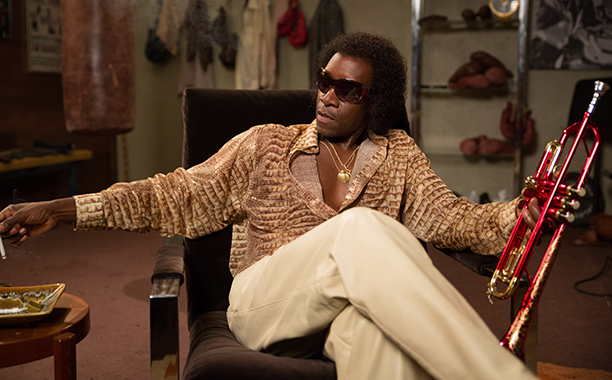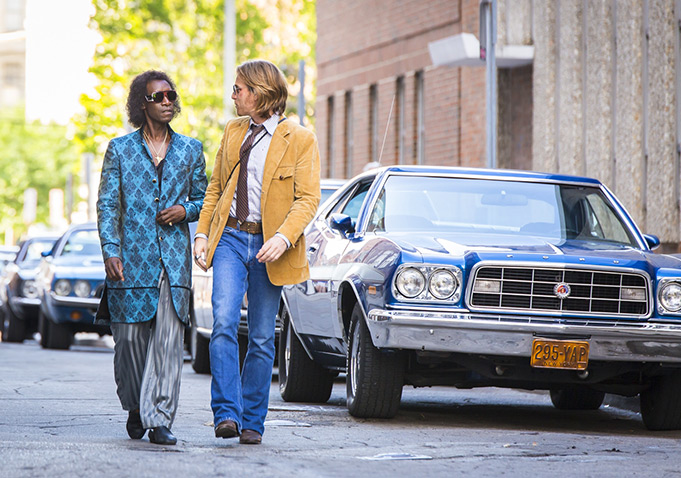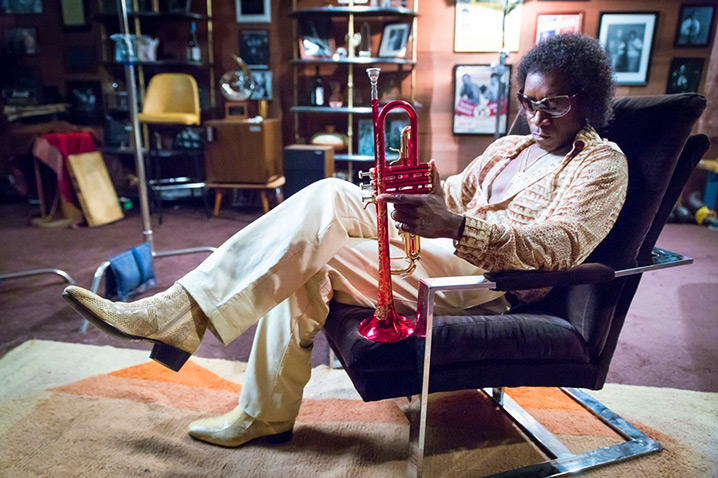By providing your information, you agree to our Terms of Use and our Privacy Policy. We use vendors that may also process your information to help provide our services. This site is protected by reCAPTCHA Enterprise and the Google Privacy Policy and Terms of Service apply.
Don Cheadle Q&A: How He Convinced Miles Davis’ Family to Make a Non-Traditional Biopic

Don Cheadle was never interested in making a standard-issue Miles Davis biopic. In fact, for a while there, he wasn’t interested in making any kind of Miles Davis biopic whatsoever. Instead, he was hoping to play the musician in someone else’s film. But years after being rumored to star in a Davis biopic, Cheadle eventually came on board to co-write, direct, produce and star in what would become the year’s most inventive biopic. Cheadle’s “Miles Ahead” isn’t just another routine take the troubled life of a gifted musician; instead, it’s an ambitious and tangential tone poem that aims to recapture Davis’ essence.
Billed as “an exploration of the life and music of Miles Davis,” the film is set in the seventies, when Davis famously retreated from public life and did very little in the way of creating. Ewan McGregor stars as fictional Rolling Stone reporter Dave Braden, who makes it his mission to track down the star and get the scoop about his current situation. Loosely structured as a buddy comedy, the film finds the initially reticent Davis eventually warming to Braden as the two embark on some wild — and wildly embellished — adventures around New York City. It also occasionally zips back in time, blurs into flashbacks and ends with Cheadle-as-Davis working it in the present day. Needless to say, it’s anything but a straightforward biopic, which is exactly what Cheadle thinks Davis would have wanted.
READ MORE: NYFF Review: Don Cheadle’s ‘Miles Ahead’ Isn’t Really a Miles Davis Biopic
Indiewire recently sat down with Cheadle to talk about his creative process in making a very creative film, how he juggled acting and directing on set and what he hopes audiences to get out of his bold new film.
The film has played extensively on the festival circuit since last year. Are you just bursting to bring it to theatrical audiences?
Am I bursting to get in a sleeping bag and zip it up and then hibernate for three months? Yeah. [laughs]. We’ve been to Berlin, we’ve also gone to SXSW, the Pan-African Film Festival, Sundance, all that [laughs]. Yeah, it’s been a lot of airplanes and car rides and hotels.
And talking about it?
And talking about it. But it’s going to be all original, everything I say today I will have never said before. [laughs] When did you realize that you had to make a movie about Miles?
When did you realize that you had to make a movie about Miles?
Well, it wasn’t something that I was chasing in any way, shape or form. It was really something that was chasing me. And that I’d heard, spoken about and people that mentioned it to me in different places. Miles was inducted into the Rock and Roll Hall of Fame. They were interviewing his nephew and he said, “We’re going to do a movie about his life and Don Cheadle is going to play him” [laughs]. So that’s when it became unofficially official.
I met with the family and they pitched me ideas, and I countered and pitched my idea about the film and how I wanted to do it. And they said “that’s great” and I said, “Okay, great. When someone pitches that movie to you and can make that movie, call me and I would love to play the part,” and it just became apparent kind of quickly that in order for that to happen, I was going to have to be the person to write it, the person to direct it.
When you first spoke with the family, were their ideas for the film more straightforward?
Yeah, I felt that they were. I felt that they were more things that we’d seen done before. I didn’t think that necessarily the experience of the movie itself would feel like Miles Davis. And that’s what I wanted. I felt like the movies were sort of about the record of Miles Davis’ life and the things that he had done — Cliff Notes of his life, in a way. Not something that would be experiential, which is what I wanted it to be.
How did you land on this more experimental approach?
I didn’t always have the idea because it wasn’t anything that I really thought about in earnest until the day before I had to go meet them. They said, “How would you do this movie?” And I said, “To me, it just has to be something that’s like Miles Davis’ music. It has to be as expansive, and creative and have the ability to go everywhere like his music does.”
Miles’ music [ranges] from funk to trag-jazz to swing to bepop to rock to hip-hop, I mean, he touched all of that. So I said, “All of that has to be a part of the movie and I don’t know how you can get all that music to be a part of the movie, unless the movie also feels like it’s a part of all of that.” I want them to feel that they relate and I said, “I want to make a movie that Miles would want to star in, as opposed to a movie that’s just about Miles.” It was “Miles Davis: Don Cheadle is Miles Davis as Miles Davis in…” That’s what I wanted it to be.
Was the family excited about that?
Yeah, excited and cautious. It was a bit of a dance, because I was asking permission to do something that no one had ever suggested to them before and that is not really the way to traditionally deal with a historical figure on film. Once they said, “Okay, you can do it,” and signed on the dotted line, I could do whatever I wanted. But I wanted them close and I wanted them to be a part of it. I wanted them to tell me how to shape it as well as challenge them to allow me to push it, because I think that’s what Miles would have wanted.
Once they said, “Okay, you can do it,” and signed on the dotted line, I could do whatever I wanted. But I wanted them close and I wanted them to be a part of it. I wanted them to tell me how to shape it as well as challenge them to allow me to push it, because I think that’s what Miles would have wanted.
That’s always how I came back to them when there would be any sort of moment of, “Are we really going to do this and not talk about John Coltrane? Are we really not going to talk about modality versus bepop? Are we really not going to check these boxes like these other movies would do?” I’d say, “Do you think Miles wants something closer to those movies that he has actually been on record saying he didn’t really like, or do you think he’d want to have something that felt more gangster and crazy and funky and wild and expressionistic and impressionistic?” And they’d always go, “Yeah, that.” I’d say, “Okay, so let’s do that. Let’s do that.”
When you bump into this period of time in Miles’ life – one of the most prolific voices of the 20th century, who changed music three or four times – when he went silent and shut it down for five years and never played the trumpet…as someone who’s reading a story, I go, “No, no, no… wait, stop, what? I want to talk about that for a minute, [laughs] I want to get into that. I understand all of this playing, but then it stops. There’s this hole in this story and I want to talk about that hole and what’s going in that hole and how do you get in that hole and how do you get out of that hole and what does it look like to get out of that hole?”

Yes! [laughs]
Did you just dive right in and let your different roles all melt into one thing?
Yeah, there are no lines. And probably not for everybody else, either. Everybody had to pick up the slack and be many different things being in that situation. I thank God that I had the actors that I had: “This dude is going to come up to me and I’m being directed by Miles Davis right now? Can I talk to Don? Is Don there?” [Laughs] On the days when I just wanted to stay in [character], I would stay in and talk to him from that point of view, but actors understand each other and we understood, “Oh, he’s got to sit in on that right now and I got to approach him like that right now” and thank God they did, because that could just be terrible.
I’ve never been directed by the person who is also the lead in the movie, but I can imagine that that could be a little bit of a grind sometimes because there would be issues of, “Do I have you? Do I have you totally? Can you hear me? [laughs] I need something from you right now! I know you got to go figure out the camera position, but I need you right here right now.”
 How often would you say you were in character when you needed to be Don?
How often would you say you were in character when you needed to be Don?
You can’t just have that granular, singular focus that you’re trying to have as an actor, so that happened a lot, but like I said, I had good people around me that shouldered the load when I was doing that.
I suspect those skills only help the next time you direct.
Yeah, and I tried to give it away. It was something that I – three or four years ago – in the process of this, was trying to hire another director to do it. I didn’t want to shoulder all of it and I had a lot of concerns about doing all of it. It was very difficult.
Well, for one, I’m glad you had that reaction, because that’s exactly the intended response which is, “Oh, this is now, this is about music today, this is about Kendrick Lamar, this is about Kamasi Washington, this is about Jack White.” Miles was a part of all of these genres of music, and what I hope more than anything, is that people leave with a desire to investigate Miles and to check out his music and to understand what #socialmusic is all about.
[That they get] that I end the movie with no death date [for Miles] because I’m saying, “He’s right here. All of this is still happening.” I feel like people are getting that. I feel like, at the end of the movie, people’s response to it has been, “Oh! This thing happened, and I loved it!”
READ MORE: Don Cheadle: Having a White Co-Star in ‘Miles Ahead’ Was a “Financial Imperative”
“Miles Ahead” opens in limited release on Friday, April 1.
By providing your information, you agree to our Terms of Use and our Privacy Policy. We use vendors that may also process your information to help provide our services. This site is protected by reCAPTCHA Enterprise and the Google Privacy Policy and Terms of Service apply.
















